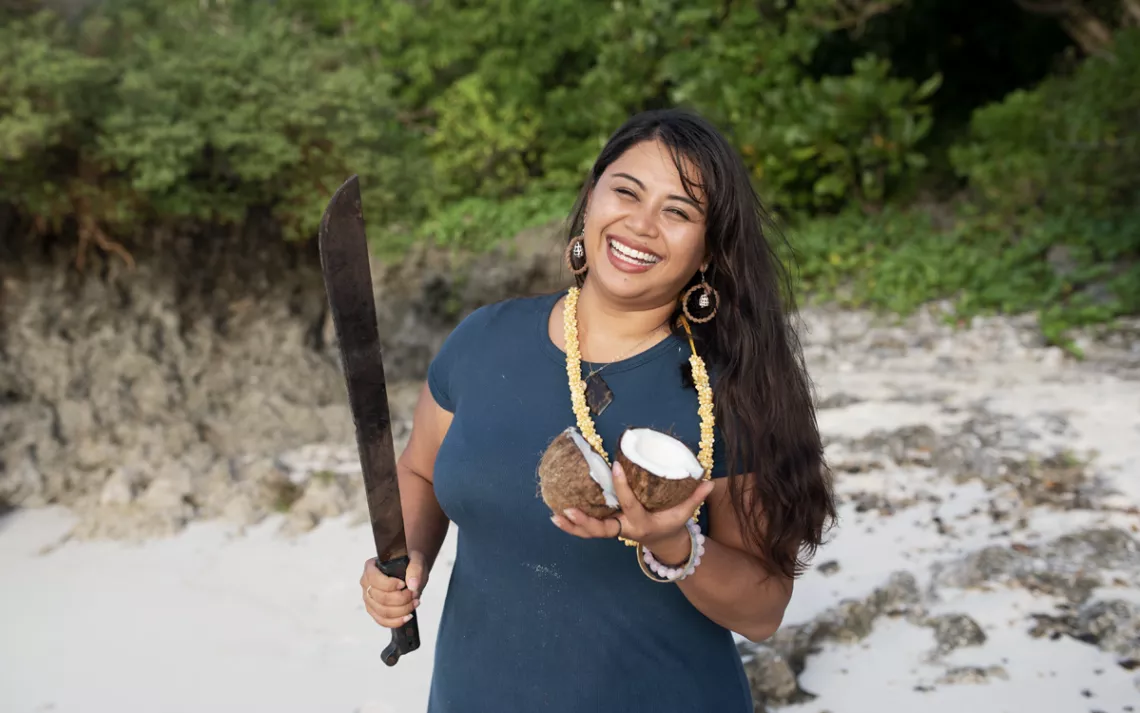Moñeka De Oro and Her Recipes of Resistance
Using food to nurture cultural identity on Guam

After the pandemic hit, Moñeka De Oro launched a program to distribute produce grown on her island. | Photo by Kayla Maltese
On a late-July morning last summer, Moñeka De Oro woke up to the news that she could no longer go spearfishing at her favorite fishing ground. Without a public hearing, the area had been turned into a firing range. The US military, which operates two major bases on Guam, owns almost one-third of the island—including some of the best farmland and the most productive fishing grounds.
De Oro has long watched the military help itself to land important to her culture. She is CHamoru, an ethnic group indigenous to the small Pacific island. CHamorus compose nearly 40 percent of Guam's citizens, but much of their cultural identity has been stripped away by centuries of colonization.
Unlike many of her peers, De Oro grew up in a CHamoru-speaking household. Her dad, an avid gardener, taught her to care for the land, while her grandmother taught her traditional CHamoru medicine. As a young adult, she apprenticed with local healers, spending her days foraging for herbs and studying the health benefits of coconuts.
In 2005, the US military announced plans to expand operations on Guam and relocate thousands of marines from Okinawa, Japan. De Oro began protesting the buildup in 2009, in response to an 11,000-page draft environmental impact statement. She and other activists gathered over 10,000 comments from residents worried about the destruction of cultural and ecological treasures. They managed to delay development at one historical site.
De Oro continued organizing against the military, but her neighbors weren't always receptive to her message. Even though residents of Guam can't vote in presidential elections, many families are intensely patriotic. Guam's rate of enlistment is higher than that of any US state. What's more, Guam has a high rate of poverty, and many people rely on the United States for aid.
To address these problems, De Oro began to work on improving food sovereignty, an effort that accelerated after the pandemic hit.
Nearly 90 percent of Guam's food is imported, so residents worried that supply chains would be disrupted. In response, De Oro partnered with some organizations to help purchase and distribute produce from local farmers. Many islanders took up gardening but couldn't find Guam-specific resources online. So De Oro helped create an online series with guides to planting and foraging. She also helped put together a plant-based cookbook that includes healthier versions of traditional CHamoru recipes—for example, a vegan take on tinaktak (a beef and coconut dish). The book sold out in weeks. One of De Oro's contributions was "Niyok 101"—a beginner's guide to using the niyok, or coconut, for everything from medicine to candy.
Located in the western Pacific, Guam is especially vulnerable to climate change, but its citizens are rarely represented in international discussions on climate. De Oro hopes to change that. "I've never met a climate change denier on Guam," she says. "We acknowledge it because we live on the front lines. We're part of a growing movement, and we deserve to be heard."
This article appeared in the January/February edition with the headline "Recipes of Resistance."
 The Magazine of The Sierra Club
The Magazine of The Sierra Club



